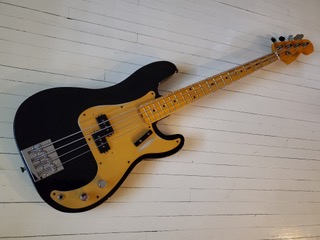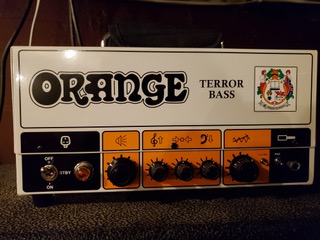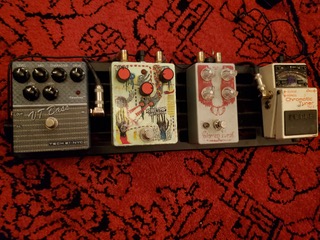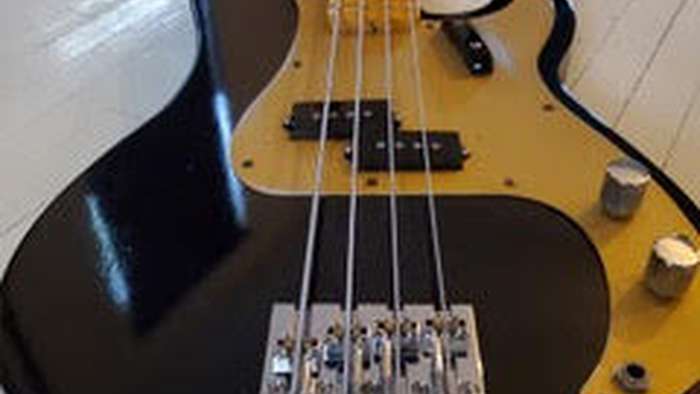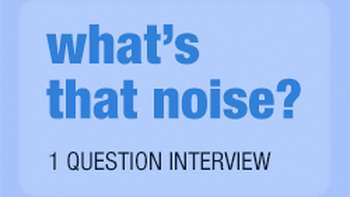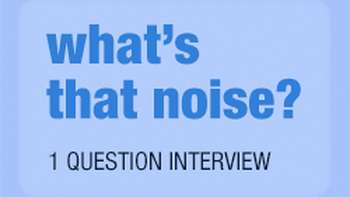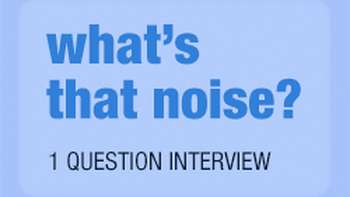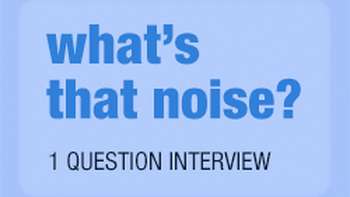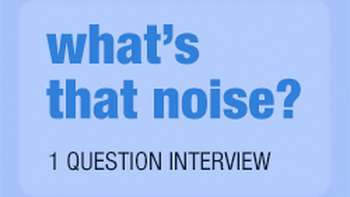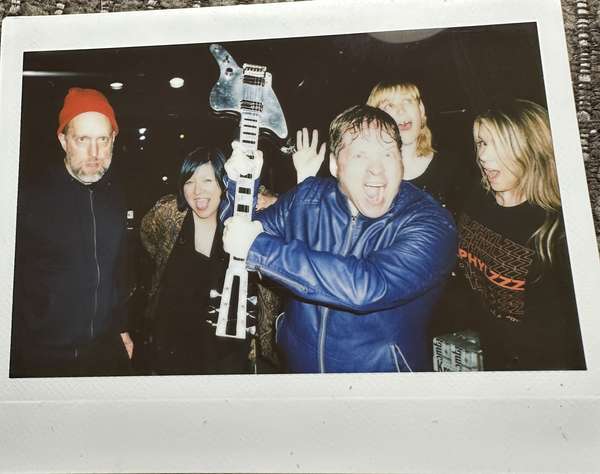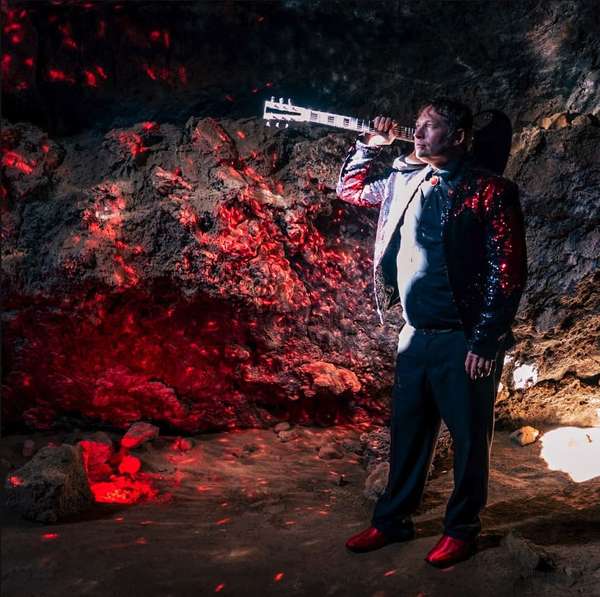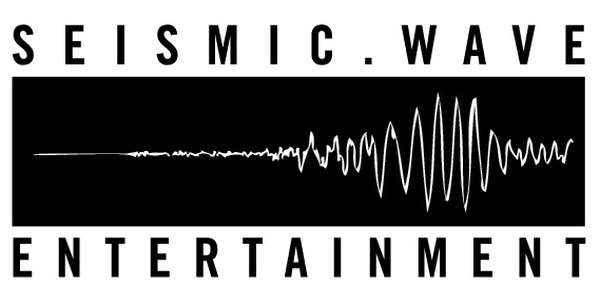Tony Ash (Conan Neutron & the Secret Friends – bass)
SPB: Tell us about your bass tone and how you set things up for your work in Conan Neutron & the Secret Friends?
Ash: I want to preface this by saying, this is the moment I've been practicing for throughout the entire existence of Conan Neutron and the Secret Friends. We have a long running inside joke about how, inevitably, somebody will approach me after our set and inquire about my bass tone. And it seems to happen after every single show. Which is fine. I can geek out all day about that stuff, and I'm not a super secretive person in regards to that sort of thing like some people. It's just music gear after all. Having said that, let's dive in.
Bass:
Currently, I'm playing a custom-built Precision Bass that Alex Macleod of Greater Guitars, based out of Louisville, Kentucky, assembled and finished for me after I sourced the parts. It's a two-piece swamp ash slab body, meaning no contours on the edges, similar to a Telecaster. It has a maple Jazz Bass neck that is insanely thick, almost like a baseball bat. I like the Jazz nut width, but I also prefer fat ‘50s spec necks, so this is like the best of both worlds. Fender Original 62 pickup, Hipshot Kickass high mass bridge, CTS/Sprague/Switchcraft electronics, black nitrocellulose finish. It's pretty basic overall, just a vintage-style P-Bass with one or two modern appointments. The one cool trick I had built into this bass is a push/pull switch on the volume pot. When pulled up, everything between the pickup and the output jack is bypassed, which gives a brighter, more aggressive tone. I use this sometimes when my strings get old and start to sound dull, or if there's a specific part in a song that calls for a really clanky, gnarly Stranglers/Jesus Lizard-esque sound. I always use DR DDT strings. They sound like the DR Hi Beams I've loved for years, but their heavier gauge makes them ideal for the drop C tuning we play in.
Amp:
These days I'm a big proponent of the Orange Terror Bass. It has five knobs, it's super loud, AND it fits in my backpack for when we do fly-out dates. Perfect. For speaker cabinets, I really love the old Mesa Boogie 15" Diesel/Road Ready cabs. A pair of those, in my opinion, smokes almost any Ampeg 8x10. Unfortunately the stock EVM-15L speakers, which sound fantastic, tend to not do so well under a lot of strain. Take it from a guy who has blown six of them. I use both Eminence Delta Pro 15A and Eminence Kappalite 3015 speakers in my cabs these days and they each do a great job while still sounding awesome.
Pedals:
I tell everyone this: the original Tech 21 VT Bass pedal is the cornerstone of my live and recorded sound. It is designed to emulate a variety of classic Ampeg tones and it nails all of them with aplomb. Without that pedal, I would be lost. You can plug it right into the front of any backline or borrowed amp anywhere and it'll make everything sound amazing. It stays on 100% of the time when I'm playing no matter what. I always follow the VT Bass with some sort of midrange-heavy drive pedal which also stays on the entire time, just to add a little extra bite and attack. Currently I'm using and loving the Robo Pedals Robotrip Distortion. Robo Pedals is based out of Baltimore, Maryland and run by Rebecca Burchette of the band Multicult (who has one of the most ridiculously amazing bass tones ever). The Robotrip is based on the classic big box Proco Rat distortion pedal, right down to the LM308 chip that every tone geek rightfully associates with classic Rat tone. It sounds fantastic. I run the gain very low, usually around 9:00, which is just enough to add that extra "something" to the base tone of the VT. After that I like to keep something in the Big Muff family on my pedalboard that I can kick on for the heavier songs or certain choruses, and my go-to for the last few years has been the Earthquaker Devices Cloven Hoof. I mean, it literally says this right on the EQD site: "Have you heard this thing on bass? Wow. Try the Cloven Hoof on a bass guitar. Seriously. Trust us. You can still cut or boost the mids, and there’s still a metric ton of output on tap, just do us a favor, and for the love of all that’s Cloven, play this pedal with a bass guitar." They're not wrong. And finally, the good old reliable Boss TU-2 tuner pedal. Classic. Indestructible. Accurate. Some tuners struggle to read the low C string on bass. Not the Boss.
I, along with the rest of the band, also exclusively use Rattlesnake Cable Company instrument and speaker cables. Hank Donovan, who runs the company, is a friend and our bands have played together in the past. They look super cool, they're well built, and they have a lifetime warranty should anything happen, such as your amp falling face first on stage and crushing them. Yep, that actually happened once. And I had new cables in my mailbox less than a week later. Try to beat that level of customer service.
